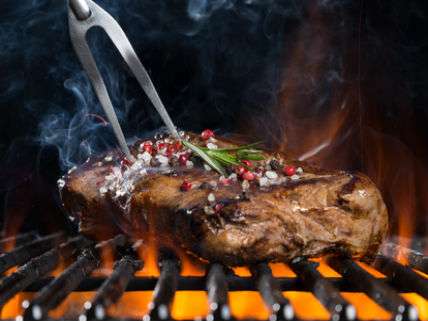Eat More Peppers, Live Longer; Eat More Grilled Meat, Die Sooner
Exploring the absurdities of modern nutritional epidemiology.

I just happened to come across two newspaper stories this week about the two new nutritional epidemiological studies purporting to find a health correlation between the consumption of two foods: hot peppers and grilled meats. The Washington Post story's headline declared, "Barbecued and smoked meat tied to risk of death from breast cancer." The New York Times article was titled, "Eat Peppers, Live Longer?"
According to the Post, "A higher intake of barbecued, smoked or grilled meat before diagnosis was also associated with 23 percent higher odds of death from all causes, the study found. Of the three cooking options, smoking may be the worst. Routinely eating smoked beef, lamb and pork was tied to a 17 percent greater risk of death from all causes…." The Times reported, "After controlling for age, sex, smoking, blood pressure, cholesterol, diabetes and other characteristics, they found that those who reported eating hot peppers had a 13 percent reduced risk for dying early."
What interested me was the difference in the way that the findings were interpreted with regard to how readers might consider changing their diets. In the Reuters story on which the Post article was based, a researcher argues that "the findings suggest women should pay attention to how they cook their food to minimize their exposure to carcinogenic chemicals." In other words, eating less grilled meat might boost your chances of living longer by 23 percent over those who continue to indulge themselves with tasty charred steaks, burgers, and sausages.
On the other hand, when asked if people seeking to live longer should eat more hot peppers, the co-author on that study observed, "The evidence isn't strong enough to make me change my diet." What? Evidently, a 13 percent reduced risk of early mortality is not enough to advise people to chomp on more habaneros.
Here's my point: I suspect that most readers will find the grilled meat story more alarming than the hot pepper one even though the risks of death posed by the nutritional habits studied in each are roughly equivalent. Why? The grilled meat story is framed as a loss whereas the hot pepper one is cast as a gain. Behavioral psychologists have long found that people fear losses more than they anticipate gains.
In any case, the hot pepper guy is entirely right: Don't change your diet based on iffy observational studies like these. With regard to pepper and barbecued meats: I say eat and enjoy both, preferably together.


Show Comments (127)